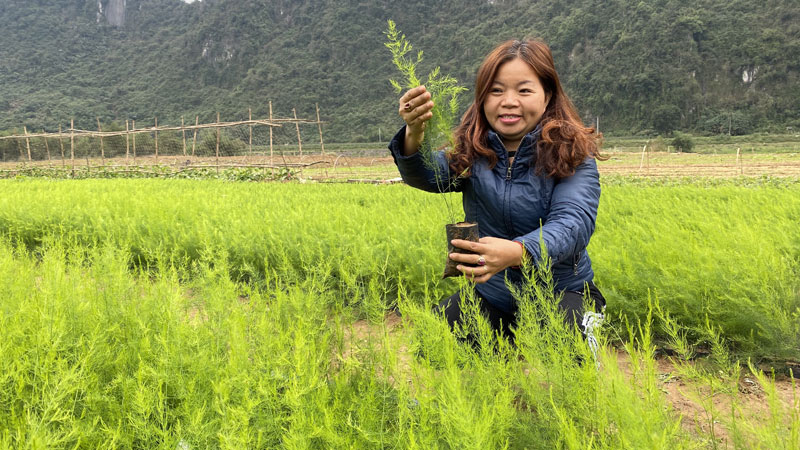
(HBO) - Phan Tuyet Nga, a local in Chuong My district (Hanoi), has brought asparagus seeds to poor land in Ben Nghia village, Phu Nghia commune, Lac Thuy district, Hoa Binh province. With nearly five years of development, her asparagus planting model has proved effective, bringing in good income. It has gradually been expanded to some surrounding areas.
.jpg) The asparagus planting model of Phan Tuyet Nga in Ben Nghia hamlet, Phu Nghia commune, Lac
Thuy district, proves effective, bringing in high income.
The asparagus planting model of Phan Tuyet Nga in Ben Nghia hamlet, Phu Nghia commune, Lac
Thuy district, proves effective, bringing in high income.
Nga shared that after learning experience in planting and caring asparagus in the
central province of Ninh Thuan, and making a fact-finding tour, she chose Phu
Nghia commune to carry out her project because this location boasts suitable natural
conditions and climate as well as abundant sources of water from Boi River. Furthermore, the transport system makes it easier to move
to nearby localities like Hanoi, Ha Nam, Nam Dinh and Thanh Hoa. Optimising these advantages,
she started to grow 24,000 asparagus roots on nealry 1.5 hectares.
Averagely, she could harvest about 70kg of
asparagus every day, some days up to 180kg, with prices ranging between 60,000
VND and 70,000 VND per kilogramme. The total annual revenue is estimated at 1.3
billion VND and the profit is over 300 million VND. Nga’s family also created
jobs for about 15 local workers, with monthly
income of about 6 million VND per person.
With the hope of developing this model
effectively, Nga has expanded the asparagus growing area to 3 hectares. She
often asks workers to frequently follow the growth of the plant to have prompt
measures to ensure the quality.
Nga is providing technical consultations
for gardens in Hoa Binh, Vinh Phuc, and Hanoi with total cost of 10 million VND
each.
Asparagus is popular among locals and
restaurants because it is rich in nutrients, and easy to prepare. "Therefore, I
want to connect with gardeners to expand the growing area, ensuring supply for
people, supermarkets, restaurants in need,” Nga said./.
According to data from the Hoa Binh Provincial Party Committee, the industrial production index for the first six months of 2025 is estimated to have increased by 20% compared to the same period last year. This marks the highest year-on-year growth rate for this period since 2020.
In the first six months of 2025, Hoa Binh province’s export turnover was estimated at 1.145 billion USD, marking an 18.11% increase compared to the same period in 2024. Import turnover was estimated at $ 804 million, a 17.15% increase, which helped the province maintain a positive trade balance.
The lives of the ethnic minority farmers in Tan Lac district have gradually improved thanks to the new directions in agricultural production. This is a testament to the collective strength fostered through the professional associations and groups implemented by various levels of the district’s Farmers’ Union.
With the motto the "product quality comes first,” after nearly one year of establishment and operation, Muong village’s Clean Food Agricultural and Commercial Cooperative, located in Cau Hamlet, Hung Son Commune (Kim Boi district), has launched reputable, high-quality agricultural products to the market that are well-received by consumers. The products such as Muong village’s pork sausage, salt-cured chicken, and salt-cured pork hocks have gradually carved out a place in the market and they are on the path to obtaining the OCOP certification.
In the past, the phrase "bumper harvest, rock-bottom prices" was a familiar refrain for Vietnamese farmers engaged in fragmented, small-scale agriculture. But today, a new spirit is emerging across rural areas of Hoa Binh province - one of collaboration, organisation, and collective economic models that provide a stable foundation for production.
Maintaining growing area codes and packing facility codes in accordance with regulations is a mandatory requirement for agricultural products to be eligible for export. Recently, the Department of Agriculture and Environment of Hoa Binh province has intensified technical supervision of designated farming areas and packing facilities to safeguard the "green passport" that enables its products to access international markets.



.jpg) The asparagus planting model of Phan Tuyet Nga in Ben Nghia hamlet, Phu Nghia commune, Lac
Thuy district, proves effective, bringing in high income.
The asparagus planting model of Phan Tuyet Nga in Ben Nghia hamlet, Phu Nghia commune, Lac
Thuy district, proves effective, bringing in high income.